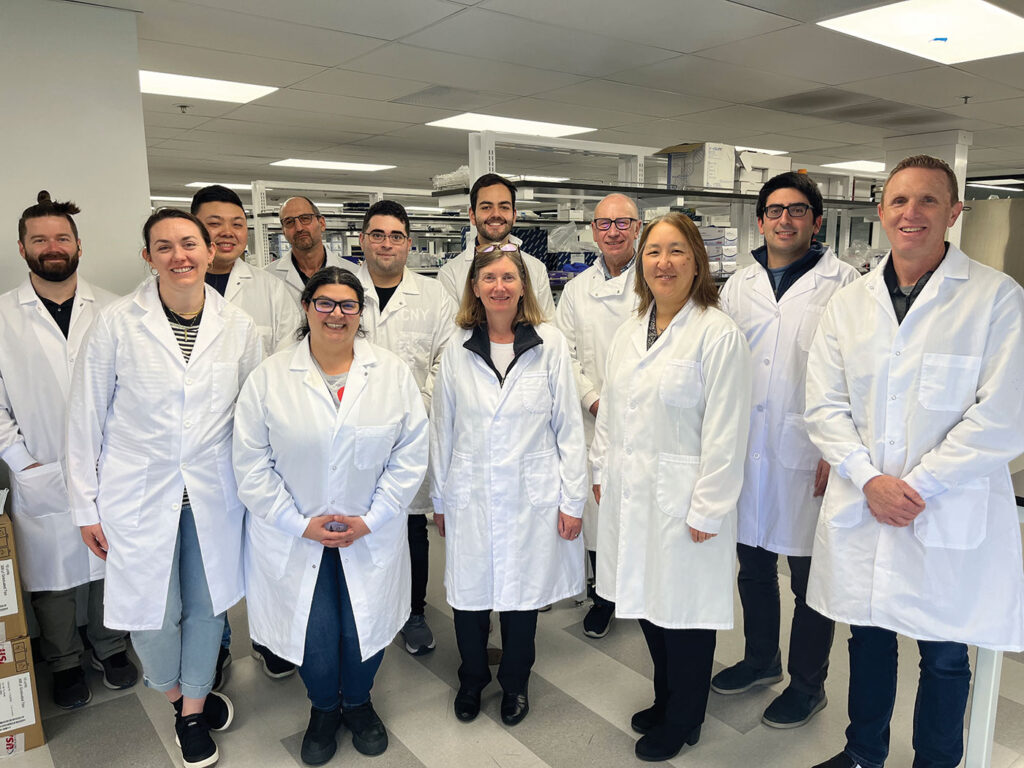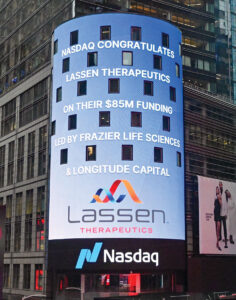
Maria Fardis, PhD, is the chief executive officer of Lassen Therapeutics, a clinical-stage company advancing first-in-class antibodies as potential treatments for fibro-inflammatory disorders and cancer. The company’s lead candidate, LASN01, targets the interleukin receptor (IL-11R) and is currently being evaluated in clinical trials for the treatment of thyroid eye disease (TED) and idiopathic pulmonary fibrosis (IPF). Lassen is also developing LASN500, a highly potent, novel checkpoint inhibitor targeting the IL-18 binding protein (IL-18BP) for cancer.
Fardis, CEO at Lassen and previously a venture partner at Frazier Life Sciences, has more than 25 years of scientific and management experience in public and private companies and serves on the board of several biotechnology companies. She recently spoke with Inside Precision Medicine’s editor in chief, Damian Doherty, about Lassen’s pipeline, the encouraging data being generated for LASN01 in fibro-inflammatory diseases like TED, and closing a successful Series B financing in late 2023 amid a challenging economic landscape for the industry.
Q: Tell me about Lassen’s lead candidate LASN01.
A: Lassen formally launched in 2020 with a goal of developing transformational medicines for patients with unmet needs. We are developing novel treatments for fibro-inflammatory disorders and oncology, with an initial focus on targeting the IL-11 pathway. IL-11 is a member of the IL-6 family of cytokines and serves as a central mediator in fibro-inflammatory diseases. What’s particularly exciting about IL-11 is that while it has a central role in fibro-inflammatory signaling, it is distinct from other factors such as TGF-β, CTGF, and IL-13 and it acts directly on fibroblasts, a disease driving cell type in the setting of TED. IL-11 appears to be involved in multiple diseases involving eye, lung, skin, or the gastrointestinal system. Lassen is focusing on IPF and TED for initial indications with the preliminary focus on efficacy in TED.
LASN01, our lead candidate, is a first-in-class, high-affinity antibody that binds to the receptor for IL-11. This antibody blocks multiple endpoints used in translational cell-based assays for TED which have been reported as predictive of clinical efficacy. It offers the potential to be a new and differentiated therapeutic option for patients as no other agents in development for TED have potent anti-fibrotic activity.

Q: What is the role of IL-11 in TED and how does LASN01 affect this?
A: TED is an autoimmune condition that affects the orbit of the eye, including eye muscles, eyelids, and other tissues. In most cases, it’s associated with Graves’ disease, a condition where the immune system attacks the thyroid gland, causing it to produce excessive amounts of thyroid hormone.
Research has suggested that IL-11 is elevated in both the orbital fibroblast and serum of TED patients, implying that IL-11 may play an important role in the development and progression of TED. In vitro studies using TED patient-derived orbital fibroblasts have shown that IL-11 induces the pathological effects fundamental to TED biology including elevation of hyaluronan (HA), an important driver of tissue edema, as well as proliferation of these diseased fibroblasts. Importantly, LASN01 can also reduce accumulation of collagen from diseased cells, showing that LASN01 has the potential to inhibit multiple pathological aspects of TED.
Our studies have shown that the effects of LASN01 on HA release are comparable to the approved anti-IGF-1R antibody, teprotumumab, which was developed by Horizon Therapeutics. LASN01 was a stronger agent in blockade of procollagen secretion and proliferation. We also have data showing that LASN01 suppresses production of several cytokines produced at the orbital fibroblast, potentially reducing inflammation.
While Tepezza®, which Amgen added to its portfolio via the acquisition of Horizon Therapeutics in 2023, is already on the market, the product has some adverse events, and more importantly, does not fully address multiple TED pathologies including fibrosis.
We believe targeting IL-11R offers a new modality for treatment of TED specifically addressing the fibro-inflammatory aspects of the disease.
Q: What is the mechanism behind LASN500?
A: LASN500 represents a novel approach in immuno-oncology. IL-18 is a potent pro-inflammatory cytokine which is produced locally in a tumor microenvironment in multiple cancer indications but is rapidly shut down by a soluble checkpoint called IL-18BP. Current checkpoint inhibitor therapies such as anti-PD(L)-1 further elevate levels of IL-18BP.
LASN500 is a highly potent anti-interleukin-18 binding protein (IL-18BP) antibody which is able to break the pre-formed complex of IL-18 and IL-18BP which exists at the tumor site, liberating IL-18 to enhance the immune response at the tumor by activating T and NK cells, releasing IFNg ultimately leading to tumor killing. Anti-IL18BP has shown anti-tumor efficacy in multiple mouse tumor models as single agent as well as in combination with anti-PD-1.
LASN500 has excellent developability with picomolar potency across multiple assays to measure immune activation, and is particularly exciting due to its ability to activate components of both the innate and adaptive immune response in a tumor environment.
Q: You recently closed a Series B financing. How will the proceeds be used?

A: In December 2023, we closed an oversubscribed $85 million Series B. We had originally targeted $60 million for the Series B, but we secured substantial investor interest and put together a round with a step-up in valuation.
The Phase I study of LASN01 in healthy volunteers is complete and demonstrated favorable safety, pharmacokinetics, and target engagement, leading to expansion of the program to patient cohorts. We will be using proceeds of the financing to continue dosing patients in our Phase I/IIa study and run a separate Phase II trial with LASN01 in patients with TED. We received U.S. IND clearance from the FDA in addition to approval of the Clinical Trial Authorization from the Medicine and Healthcare Products Regulatory Agency. Multiple sites are currently active in both the Phase I/IIa and the Phase II programs in U.S., U.K., and APAC regions enrolling patients. LASN01 is currently administered as IV every four weeks. As part of our use of proceeds, we have initiated the development of the subcutaneous formulation of LASN01, which is expected to be ready for the later stage of development of LASN01.
We expect this funding to take Lassen to late-2025. Expected clinical data read outs are planned during 2024 and 2025.
At Lassen, we are pioneering developing drugs against two novel targets with significant potential in fibro-inflammatory disorders and cancer and are excited to use the capital we raised to continue to bring potentially transformational medicines to patients.
Damian Doherty has been in media and publishing for nearly 30 years, beginning in the early nineties at News Corporation. Damian has managed, edited, and launched life science titles in drug discovery and precision medicine. He was features editor of Drug Discovery World for fourteen years and founded, established, and edited the Journal of Precision Medicine in 2014. In parallel, Damian founded and organized the Precision Medicine Leaders’ Summit, a global, immersive three-day senior leadership conference that still runs today. He edited AIMed magazine in 2019 before launching Photo51Media, a platform for illuminating untold, compelling stories in precision healthcare. Damian joined Mary Ann Liebert in 2021 to help steer the new rebrand and relaunch of Clinical OMICS to Inside Precision Medicine.














